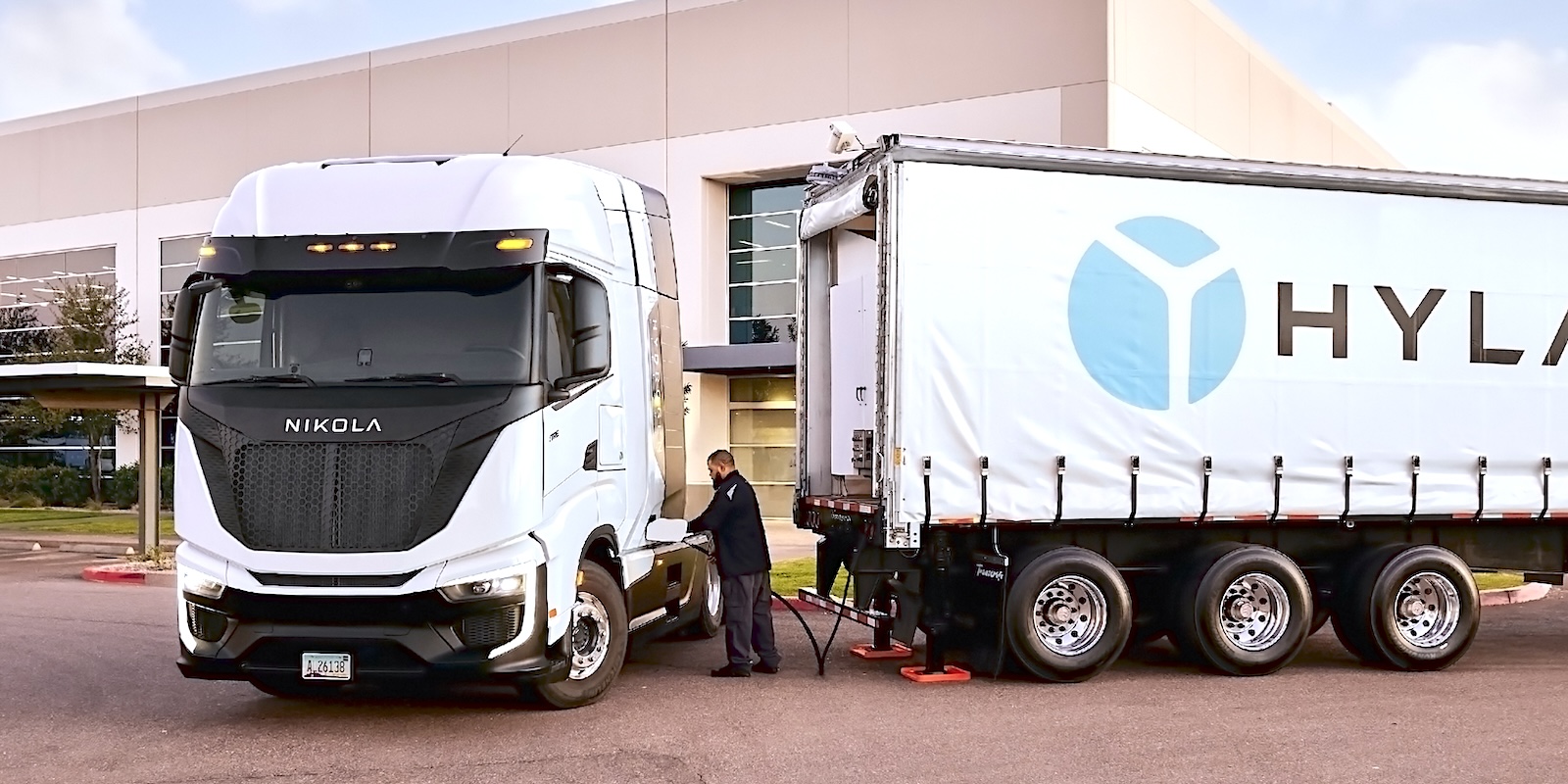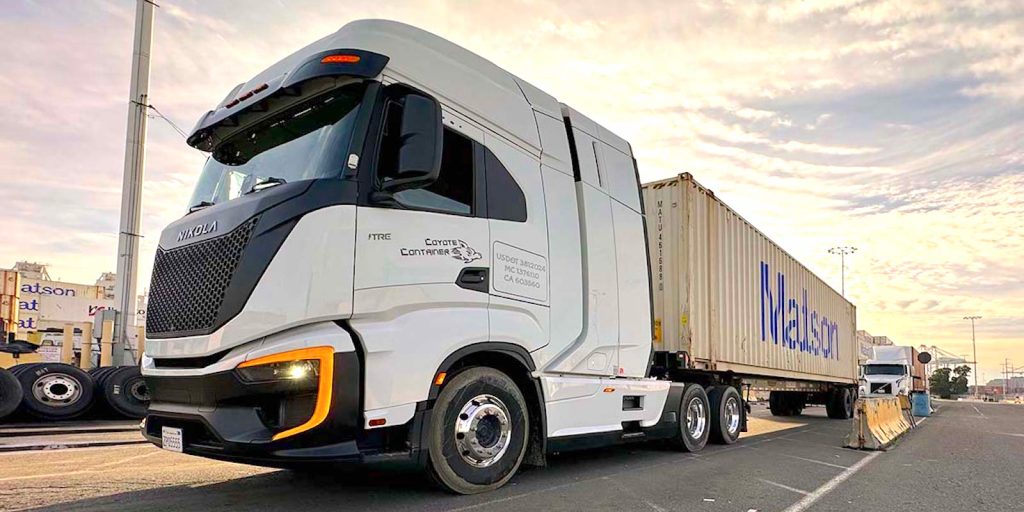
Nikola stock sinks to a 52-week low, a NHTSA complaint claiming the fuel cell shuts down unpredictably, and one of hydrogen’s early adopters remains unconvinced. Is it time for Nikola to throw in the towel on hydrogen?
William Hall’s Coyote Container company made headlines earlier this year, when it became the first company to successfully complete a 400-mile delivery in a Nikola Tre semi truck powered by a hydrogen fuel cell.
Hall, Managing Member and Founder of Coyote Container, drove the hydrogen Nikola over the hilly, 400-mile route that took the truck and its 17.7 ton trailer through California’s Altamont Pass and Grapevine Canyon on the I-5 interstate between the Port of Oakland and the Port of Los Angeles in Long Beach. The trip seemed like a ringing endorsement for the hydrogen-powered trucks. Nearly a year later, though, William seems to have soured on the early adopter experience, specifically citing higher-than-anticipated operating costs, fuel costs, weight limitations, and warranty concerns.
Coyote Container’s Nikola

“The truck costs five to ten times that of a standard Class 8 drayage [truck],” Hall told Clean Trucking. “On top of that, you pay five to ten times the Federal Excise Tax (FET) and local sales tax, [which comes to] roughly 22%. If you add the 10% reserve not covered by any voucher program, you are at 32%. Thirty-two percent of $500,000 is $160,000 for the trucker to somehow pay [out of pocket].”
Coyote Container isn’t alone in expressing concerns about the practicality of hydrogen trucks in general, but there are concerns about Nikola’s hydrogen semi truck, in particular.
In an official NHTSA complaint made against one Nikola HFCEV, the truck experienced five roadside propulsion outages resulting in three towings and two instances where the truck had to limp home on battery power. The failure was unpredictable, cutting off power while the vehicle showed between 20 and 140 miles left of FC range.
The first such incident happened with about 900 miles on the truck’s odometer, while the most recent occurred at 28,340 miles. You can read more about the Nikola NHTSA complaint, below – or just read Hall’s summary of the situation, in his own words: I have dealt with more tow trucks in the last 10 months than in my entire 62 years on this Earth.
NHTSA ID Nu. 11621826

While no recall has been issued for the above issue yet, the company has been no stranger to recalls in the past, and may be sensitive about issuing another one as its stock reaches a new 52-week low (more on that in a minute).
Regardless, the company issued a technical service bulletin (TSB) on October 29th, just 13 days after the official NHTSA complaint was filed.
The TSB itself mentions that, “a coolant fitting may come loose due to excess tension on a coolant line. Extension of the hose returns the tension to an appropriate level,” but while it’s unclear whether or not the TSB is intended to address the propulsion system, what is clear is that the TSB impacts VINs 001-266 – effectively all of the Nikola hydrogen semis currently on the road (as of September 30, Nikola reported selling 235 hydrogen semis).
And as for what it costs to fill up one of those 266 hydrogen semis? Hall says it’s impossible to tell. “No one will tell you what the H2 fuel costs,” he said. “This is because it’s being subsidized by the truck manufacturers by artificially raising truck pricing. This is a severe market distortion.”
Hall also said the added weight of the truck’s hydrogen system, compared to a conventional semi, was also hurting his ability to operate the trucks. “A Nikola Tre FCEV weighs 27,000 pounds versus my heaviest [diesel] sleeper weighing 19,400 pounds,” he told Clean Trucking, in that same interview. “Most drayage trucks weigh between 16,000 to 18,000 pounds. Shippers max out cargo whenever they can, so I have to constantly switch to a diesel in order to be road legal.”
A higher GVWR rating for ZEV trucks, especially on drayage facilities and on off-highway routes with lower relative speeds, could help mitigate that issue without adding excessive risk at highway speeds.
That won’t happen overnight, however, and Hall is losing patience.
The Coyote Container founder took to LinkedIn to vent. There, he shared some thoughts on a Seeking Alpha article calling Nikola a, “strong sell.” Hall wrote, “I have experienced an amazing amount of warranty repair down time in the last 14 weeks only making five of my weekly trips from Oakland to Long Beach. Dealing with battery failures and fuel cell shutdowns.”
Dave Baiocchi, General Manager of ETHERO Truck + Energy (the selling dealer), chose to respond to Hall publicly, writing in defense of Nikola, “I think it’s fair to say that as an extremely early adopter of this technology, and with one of the first units off the assembly line this truck has served you well.”
Nikola recently celebrated the production of its 300th hydrogen semi truck at the company’s Coolidge, Arizona facility. Nikola’s third-quarter net revenue reached $25.2 million, falling short of Wall Street estimates of $37.2 million. The miss was blamed on the unexpected costs associated with the repurchasing of 20 battery-electric Nikola Tre trucks in October.
Electrek’s Take

Despite what might be perceived as the negative tone of this article, I want Nikola to succeed. I want to see a new American truck company figure out a way to succeed, and a way to continue to grow. That said, having proxy arguments with your customers about very real, very concerning issues on social media – and through your dealers – isn’t the way to do that.
We (I) reached out to Nikola staff through both email and LinkedIn on Tuesday regarding these facts and other (as yet) unsubstantiated rumors about its 2025 FCHEV production plans, but received no response as of EOD, Friday, when this story went live.
SOURCES | IMAGES: Fuel Cell Works, NHTSA, Clean Trucking, Investing, Electric-Vehicles.com, Seeking Alpha, and Coyote Container, via William Hall (links throughout the article).
